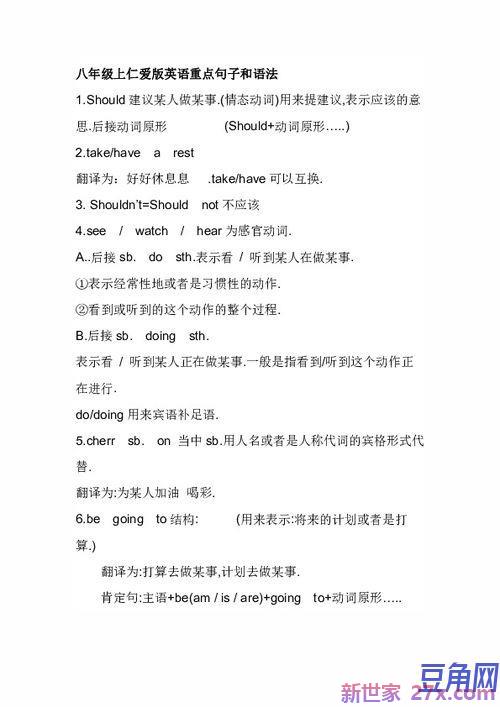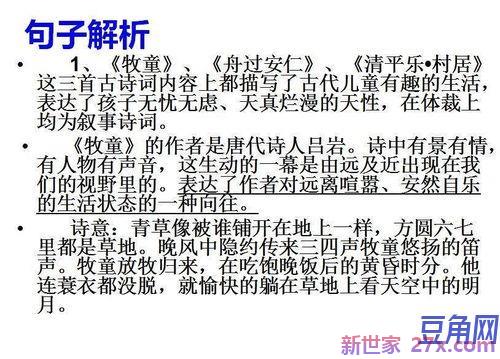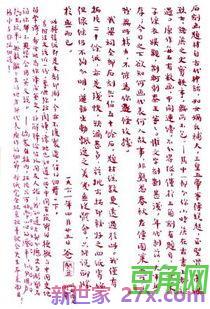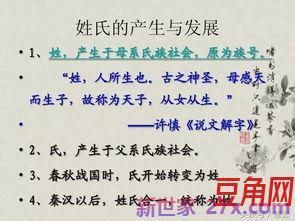|
微信分身24小时自助商城:
微信分身24小时自助商场:
微信分身24小时自助商场: |
1.仁爱英语九年级重点词组全
1. a (large) number of 许多2. a great deal of 很多3. a great many 很多的,非常多的4. plenty of 充足,大量 5. be able to do sth. 能够(有能力)做某事6. add to 增添7. be afraid of 害怕8. after a (short) while过了一会儿9. after all 毕竟,终究10. again and again 反复地,再三地11. agree to do sth. 同意12. agree on 商定,决定13. agree with sb. 赞成某人的意见14. go ahead (口语,将正说的话或正做的事)继续下去15. not… at all (用来加强not的语气)一点也不16. all over 到处,结束17. all right 行了,好吧;(病)好了18. all kinds of 各种各样的19. all over the country/world 全国,全世界20. all sorts of 各种各样的21. all the best 万事如意22. all the year round 一年到头23. and so on 等等24. be angry with sb. 生(某人)的气25. one after another 相继,顺次26. arrive in/ at 到达(某地)27. as…as 像,如同28. not so… as 不像,不如29. as a matter of fact 事实上,其实30. as a result 结果31. as if/ though 好像32. as well 也,又33. as/ so far as (表示程度,范围)就… 尽… 达到…34. ask… for 询问,向…要35. at a time 每次,一次36. at breakfast 早餐时37. at home 在家(里)38. at last 最后,终于39. at once 立刻,马上40. at school 在学校,在上课41. at work 在工作42. at least 至少43. at one time 以前,曾经44. at present 现在,目前45. at the bottom 在底端46. at the end 最后47. at the latest 最迟,至迟48. at the most 至多,不超过49. at the same time 同时50. be away from 远离…51. go/ run away 走(跑)开52. be about to 即将53. be anxious about 为…而忧虑54. be familiar with 对…熟悉55. be famous for 因…而著名56. be fit for 适合于57. be fond of 爱好,喜爱58. be made from 由…制造59. be made up of 由…组成60. be popular with somebody 受某人欢迎61. be rich in 在…充足(充裕)62. be tired of 厌烦做某事63. be uncertain about 对….不确定64. be used to 习惯于(be accustomed to)65. beat to death 打死66. because of 由于,因为67. make the bed 整理床铺68. before long 不久69. beg one's pardon 请原谅70. begin … with 从…开始71. belong to 属于72. best seller 畅销书73. had better (do) 最好(做)74. a bit (of) 有一点儿75. blow away 刮走,吹走76. body language 身体语言77. be born 出生(于)78. both… and 两个都,既…又…79. a bowl of 一碗80. break away from 脱离…81. break out (战争,火灾等)突然发生,爆发82. break the rule 违反规定83. bring down 降低,使倒下84. bring in 引来,引进,吸收85. bring on 使前进86. bring up 教育,培养87. burn down 把…烧成平地,烧光88. burn … to the ground 把…烧成平地,烧光89. be busy doing sth. 忙于做某事90. be busy with sth. 忙于(做)某事91. not only…but also… 不但…而且…92. by bus/ car/ air/ plane/ train/ ship 乘公共汽车/汽车/飞机/火车/轮船93. by accident 偶然94. by mistake 弄错地95. call at (a place) 访问(某地)96. call back 回电话97. call for 提倡;号召;需要98. call in 召来,召集99. call on 拜访,访问100. play cards 打扑克101. care for 照顾,喜欢102. carry off 携走,夺走103. carry out 开展104. catch cold 着凉,伤风105. catch up with 赶上(或超过)106. catch fire 着火107. shopping centre 购物中心108. change into 转换成,把…变成109. change … for… 用…换…110. chemical rain 酸雨111. cigarette end 烟头112. clean up 收拾,整理113. clear away 把…清除掉114. clear up 整理,收拾115. come back 回来116. come down 下来117. cme from 出生(于);来(自)118. come in 进入,进来119. come on 跟我来120. come about 发生,产生121. come across (偶然)遇见(或发现)122. come off 从…离开,脱离123. come out 出来,(书等)出版,发行124. come to 共计,达到125. come true 变为现实,成为事实126. come up 上来,上升,抬头127. compare… to 与…相比128. compare with 与…比较129. congratulation… on 祝贺…130. connect to 连接,相连131. connect with 与…相连132. consider doing sth. 考虑做某事133. consider… as 把…看作134. cut down 砍倒135. cut off 切断136. cut through 剪断,凿穿137. cut up 奇根割掉,切碎138. depend on 依靠,相信,信赖139. die of 死于140. die out 消失,灭亡141. pide… into 把…分成142. date from 始于(某一历史时期)143. day after day 日复一日的144. day and night 夜以继日的145. day-time 白天146. deal with 处理,对付147. do sb. a favor 帮某人一个忙148. do well 做得好149. do wrong 做坏事,犯罪150. dozens of 几十151. dream of 做梦,梦见152. drop in 顺便拜访153. on duty 值班,值日154. each other 互相155. earn one's living 谋生156. eat up 吃完,吃光157. in the end 最后,终于158. end up 结束,告终159. enjoy oneself 过得愉快160. even if 尽管,即使161. even though 尽管,即使162. in the evening 在晚上163. for ever 永远164. every two years 每两年165. face to face 。
2.8到9年级重点句子并翻译 仁爱版
仁爱版英语单词列表和重点句子和语法八年级1.Should建议某人做某事。
(情态动词)提出建议,这意味着它是什么意思。后接不定式(如若+不定式。
..) 2.take/have译为休息:休息把/有互换 3.Shouldn'T =应切忌不 4参见/手表/感官动词听到。 1。
其次某人。做某事。
据说看到/听到某人做某事。 ①经常表达方式或习惯性的动作。
整个过程②见过或听说过这个动作。 2。
其次某人。做某事。
表示看到/听到某人正在做。一般是指看到/听到这个行动正在进行中。
做/做对宾语补足语。 5.cherr某人。
上某人。用人单位名称或人称代词。
宾格形式,而不是译为:有人加油/喝彩 6.be将结构:(用来表示:未来的计划或意向)翻译:要做些什么,计划做一些肯定答复:主语+是(上午/是/是)+去+不定式。.. 否定句:主语+是(上午/是/是)+不+要+不定式。
.. 问题:是(是/是)+主语+会+不定式。.. 特殊疑问句:疑问词+被+主语+去。
7.prefer +名词/动名词/代词/宾语从句/不定式 8.join =成为会员翻译加入。说加入一个组织或团体。
9.play玩的。. 10.arrive + +中大的地方/在+小地方的代名词到达+是:到达/到达译为:到达某地 11.go.come。
休假表示传输的位置,现在可在进步,表示将来的动作。 12。
请某人。 /某事。
+形容词作/人怎么像 13.be适合右。..有利的是坏右。
..有害 14.keep某物。 / SB。
+形容词使某人/某物保持某种状态 15。主语+花某物+时间+。
/(做某事)有人花时间/金钱做某事 16.pretty =非常或相当译为:非常,非常 17.There是当这句话一般是在未来:翻译(一个地方的东西)①+有要到+是。
(将要判)②有+ +将是。
(会判,任何人变化的数量要发生)。 18.be确定+中(从句)/做某事翻译为:自信 19.do某人一个忙/帮助某人/给某人一只手的帮助是经常用来表示 20.one中的+名词/代词宾格翻译为复数形式:。
..一个的,如果做一个课题,在第三人称单数 21.Would你介意+做STN。?做。
..你介意吗? 你会介意+不+做STN。 。
你不介意你呢? 英语,这意味着表达委婉的请求答:①接受:一禁止一点问题都没有2.of当然不是没有问题②拒绝:1.I对不起,我怕你最好不要难过,我怕你不能做 22.need +做某事翻译为:需要做一些事情 23.keep做某物译为:继续做一些 24.lose比赛输..愤怒与某人的游戏 25.be翻译为:原料气体与某人作为介词,某人采取人称代词宾格形式 26.have打架斗殴,打架斗殴做名词讲 27 。
说对不起某人翻译:向某人道歉某人名词/人称代词宾格形式 28.with一个人的帮助下/与某人的帮助下翻译为:有人帮助 29.keep某人做某事翻译:有人有做一些事来让时间 30.will句子一般将来:(将无人称和数的变化,适用于任何人)①肯定句:主语+会+不定式翻译为:计划,打算做一些事情②否定句:主语+会+不+不定式翻译:没有打算,没有计划做一些事情③怀疑一句:请问+主语+动词原形。翻译为:?打算,计划做一些正确的事情回答:? 1肯定的回答是,主语+将2否定的回答:不,主语+不能/不会 31.be迟到迟到,迟到 32.be对不起+某物/做某事翻译:作为。
觉得自己很重要对不起 33.be给某人翻译:这是很重要的人 34.quite +位/很多,挑用来修饰名词的频率后说 35.enjoy做某事喜欢的事 36.start/begin +做某事/做某事翻译为:开始的东西 37.also用于肯定句句子的任何一方都一般用于太否定句一般用于肯定句以及用于句末,一般用于肯定都认为“太”的意思 38.get动词,容易疲倦做动词,其次是累的(形容词)做表语 39.build SB了翻译:增强人。
某人。然后宾格人称代词和名词形式40.have乐趣做某事的乐趣 41.have乐趣/从有一个良好的时间/享受自己。
翻译:有一个好时机。
快乐 42.have乐趣做某事/享受做某事翻译为:愿意做一些事情 43.fill出=填填填写某人出填补。
某人。人称代词的名词/宾格形式和。
44.be现场;和。
一起 45.be友好某人翻译为:一个人友好 46 ..交朋友与某人翻译:与某人 47.prefer交朋友。
到..翻译为:对比。
更喜欢。
48.maybe是副词,这意味着大概,也许也许的意思做状语可能会可能会在句中情态动词,再加上翻译为:可能是,可能是谓词大约几分熟/怎么样+中的句子/动名词译为名词:。
怎么样 50.be免费反义忙译为:自由忙碌 51.every +基地+复数名词性词语的翻译为:“每一个。”
52.be喜欢的+名词/动名词=如+动名词/名词译为:爱,愿意做一些事情有什么错。 =什么事=什么,询问?每一种情况下感冒=捕捉/得到一个寒冷感冒为什么不+动词原形。
你为什么不。
两者都是同义句,全部用在建议,更好地4.had +不定式译为:最好做一些事情,任何人最好+不+不定式译为:最好不要做一些不变化任何款项。
5.take某人/某物+到+地点译:与某人/某事去的地方 6.sth与某物译为:增加一些项目 7.too许多+可数名词复数形成。
太多+不可数名词,修饰动作后使用动词。 过于+形容词/副词。
8。不定代词形容词:不定代词名词前使用+形容词 10.sick,名词的定语所翻译为:生病生病不能做既可以在句子11.worry 人称代词/名词约+宾格形式。
12.both 。和。
做主语,谓语动词复数的=手/很多=多=多译为13.plenty:一些很多的。
3.仁爱英语九年级上册的重点语法
一. 现在完成时1.基本结构:助动词的 have/has 动词的过去分词;举例:1)否定式 :I (you)have not/ haven't worked;; you haven'tbeen here for a long time; 2)疑问句:把 have/has 提的主语前面即可;如:have they finished the work yet ? have 3)简单回答:yes ,you (i) have.; No ,you (i) have not / haven't. Yes ,he (she/it )has.;Not ,he (she/it) has not / hasn't. yes , you (we / they ) have . Not ,you (we / they ) have not / haven't . 2 .have (has)been to 与 have (has) gone to 的区别: 的区别: ) 1) been to 地点;如:I have been to Shanghai twice; ) 地点; 2) gone to 地点; 如: he has gone to Shanghai . 地点; ) 3). Been in 地点; 地点; 如:I've been in Shanghai for three months; 过去某个时间点/从句 的区别: 从句” 3.表示现在完成时的有关两个时间状语:“for 时间段 与“since 过去某个时间点 从句”的区别: 表示现在完成时的有关两个时间状语: 时间段" 表示现在完成时的有关两个时间状语 1) 现在完成时加““ 现在完成时加““ ““for 时间段 的时间状语:指完成时态的具体时间有多长的时间段; 时间段" 的时间状语: 如: Bobby has been away from the park for two hours;; ; 2)现在完成时 “sine 过去某个时间点/ 从句(用过去式)”;表示“自从…..以来”它前面的主句通常使用完成时。
如: B obby has been away from the park since 8 o' clock ;注:表示自 8 点以来一直到现在的时间;4.把非延续性动词或瞬间动词要改成延续性动词或短语如 come→be;go out→be out;leave →be away(from);begin→be on; die → be dead; become → be; open → be open; close → be close; 重点复习 24 页; 5.现在完成时可以和不明确指出时间的状语连用 现在完成时可以和不明确指出时间的状语连用;如:already、yet 、just、before、ever、lately、once; 现在完成时可以和不明确指出时间的状语连用 have you heard from you friend lately ? (你最近 最近收到你朋友的来信了吗?) 最近 6.现在完成时也可以和包括现在在内的时间状语连用 现在完成时也可以和包括现在在内的时间状语连用;如:this week, this morning;today,this year; 现在完成时也可以和包括现在在内的时间状语连用 7.现在完成时不可以和明确表示过去的时间状语连用;如:yesterday, last week, in 1999;two days ago; 现在完成时不可以和明确表示过去的时间状语连用; 现在完成时不可以和明确表示过去的时间状语连用 just now ,when I came (come 的过去式)in; 直接引语和间接引语;包括四个方面的内容: 二. 直接引语和间接引语;包括四个方面的内容:1.定义; 2. 直接引语变间接引语后语序的变化;3.时态变化; 4.指示代词即、时间状语、地点状语和动词的变化; 1.定义 定义:直接引用或复述别人的话,被引用或复述的部分叫直接引语,必须放在括号中,位置在句首或句中; 定义 用自己的话转述别人的话,被转述部分叫间接引语,不用括号 ,一般用宾语从句或复合宾语表示; 2. 直接引语变间接引语后语序的变化: 直接引语变间接引语后语序的变化 1)若直接引语为陈述句,一般变成以 that 引导的宾语从句; 2)若直接引语为一般疑问句,一般变成以 whether 引导的宾语从句(口语用 if 代替),但从句要用陈述 句语序; 3)若直接引语为特殊疑问句,疑问词变成连接词,语序改为陈述句语序,标点符号的使用由主句决定; 4)若直接引语为祈使句,多使用不定式,变成“ask/ tell / order sb.(not)to do sth."的句式; (详见:43 页语法精讲;ask(问),tell(告诉),order(命令) 3.时态的变化 时态的变化:间接引语的时态要与主句的时态一致,分 3种情况; 时态的变化 1) 当主句的谓语是现在或将来时态时,从句可以按需要使用任何时态;2) 当主句谓语是过去时态时,从句中的时态要做相应的变化,见 43 页表; 3) 当主句谓语是过去时态时,而宾语从句叙述的是某一客观真理(事实)时,宾语从句的时态用一般 现在时; 4.指示代词 时间状语、地点状语和动词的变化: 指示代词、页的表; 4.指示代词、时间状语、地点状语和动词的变化:见 43 页的表; 不定代词:不指明替代任何特定名词或形容词的代词叫不定代词;可以做主语、表语、宾语、同位语、定语 三. 不定代词。 详见 53 页;包括四方面的内容: 1.种类 种类。
1)许多:many(可数)、much(不可数)、a lot of、lots of、plenty(大量) of; 种类 2)一些:some、any、a few(可数)、a little(不可数); 3).就几乎没有:few(可数)、little(不可数); 4).指两者:each(每个)、either(任何一个)、both(全都)、neither(都不)、(the)other 5)两者以上:each/every(每个)、any(任何一个)、all(全都)、nonne/no(都不)、another(另 6)some、any、no、every 都可以和 one、body、thing 连用,构成复合不定代词;如: 构成人:someone、anyone、no one/none、everyone; somebody、anybody、nobody、everybody; 构成物; something、anything 、nothing、everything; 7)复合不定代词做主语时,谓语动词用。
4.仁爱英语九年级上知识点及短语(1、2)单元
Unit 1 复习要点 一、短语。
1. by making flashcards 通过做单词抽认卡 2. ask…for help 向某人求助 3. read aloud 朗读 4. that way (=in that way) 通过那种方式 5. improve my speaking skills 提高我的会话技巧 6. for example 例如 7. have fun doing sth 玩得高兴 8. have conversations with friends 与朋友对话9. get excited about 为…高兴,激动 10.end up speaking in Chinese 以说汉语结束对话 11.do a survey about… 做有关…的调查 12.keep an English notebook 记英语笔记 13.spoken English (= oral English) 英语口语 14.make mistakes in sth 在… 犯错误 15.get the pronunciation right 使发音准确 16.practise speaking English 练习说英语 17.first of all 首先 18.begin with 以…开始 19.later on 随后 20.in class 在课堂上 21.laugh at 嘲笑 22.take notes 记笔记 23.enjoy doing 喜欢干… 24.write down 写下,记下 25.look up (v + adv) 查找,查询 26.native speakers 说本族话的人 27.make up 编造,虚构,化妆,打扮 28.around the world 全世界 29.deal with 对待,处理,解决 30.worry about (be worried about) 担心,担忧 31.be angry with 生某人的气 32.stay angry 生气 33.go by 消逝 34. regard…as… 把…当做… 35.complain about/of 抱怨 36. with the help of 在…的帮助下 37.compare…to (with)… 把…和…作比较 38.think of (think about) 想起,想到 39.physical problems 身体上的问题 40.break off 中断,突然终止 41.not…at all 根本不,全然不 42.make complete sentences 做完整的句子 43.join 加入某团体 并成为其中一员; join in与take part in指参加到某项活动中去。 44.be afraid of 害怕 be afraid to 害怕 45.have trouble in doing sth 做。
.有困难 46.study for a test 为考试用功 47. make vocabulary lists 做单词表 48. too …to… 太…而以致于不能做 49.watch English-language TV 看英语电视 50. to begin with 首先 51.take a lot of grammar notes 记大量的语法笔记 52.look up the words in a dictionary 查字(词)典 53.this kind of paper 这种纸 54.spend …on … 在…上花费(时间、金钱) 55.speak English as a second language 把英语当做第二语言来说 56.give up 放弃 57.in the future 在将来 二、句型。 1. How do you study for a test? 你怎样为考试做准备? 2. I have learned a lot that way. 用那种方法,我已经学到了很多东西。
3. It's too hard to understand the voice. 听懂那些声音太难了。 4. Memorizing the words of pop songs also helped a little.记流行歌曲的词也起作用。
5. Wei Ming feels differently. 卫明有不同的感受。 6. He finds watching movies frustrating. 他觉得看电影让人感到沮丧. 7. She added that having conversations with friends was not helpful at all. 她又说和朋友对话根本没用。
8.I don't have a partner to practice English with. 我没有搭档一起练习英语。 9. Later on, I realized that it doesn't matter if you don't understand every word. 随后,我认识到听不懂每个词并没有关系。
10.It's amazing how much this helped. 我惊异于这些方法竟如此有用。 11.My teacher is very impressed. 给老师留下了深刻的印象。
12.She had trouble making complete sentences. 她很难造出完整的句子。 13.What do you think you are doing? 你在做什么? 14.Most people speak English as a second language. 英语对于大多数人来说是第二语言。
15.How do we deal with our problem? 我们怎样处理我们的问题? 16.It is our duty to try our best to deal with each challenge in our education with the help of our teachers. 在老师的帮助下尽我们最大的努力来应对挑战是我们的责任。 三、语法。
1. 动词不定式 (1)做定语—后置 The best way to learn English is reading aloud. The fastest way to travel is by plane (2)与所修饰的名词构成动宾关系 I need a pen to write with. I don't have a partner to practice English with. I need some paper to write on. I don't have a room to live in. 2. 动名词 (1)作主语(谓语为第三人称单数) Memorizing the words of pop songs also helps a little.记流行歌曲的词也起作用。 Swimming is good for our health. (2)作宾语 在动词(keep\practice\finish \enjoy\hate\be busy\mind) 后只用—ing 作宾语 Eg. We should keep speaking English in class. He often practices singing in the morning. I have finished reading the book. Would you mind opening the door? (3) 作定语 I think that doing a lot of listening practice is one of the secrets…… Unit 2复习要点 一、短语。
1. used to 过去常常 2. be afraid of 害怕… 3. over here 在这边 4. be interested in 对…感兴趣 5. on the swim team 游泳队的队员. 6. be terrified of 惧怕… 7. go to sleep 入睡 8. all the time 一直 9. chat with… 和…聊天 10.stressed out 感到紧张 11.cause trouble/problems 惹麻烦 12.pay for 付款 13.look after 照顾 14.do sth. as well as sb. can 尽可能好地… 15.gym class 体操课 16.in the end 最终 17.make a decision 下决心 18.head teacher 班主任 19.talk with 和…谈论 20.to one's surprise 令。
5.仁爱版初三上学期重点短语
unit1 1 not at all --------------------一点也不 2 end up-------------------------最后 3 make mistakes------------------犯错误 4 later on-----------------------随后 5 be afraid to ------------------害怕 6 laugh at-----------------------嘲笑 7 take note ---------------------做笔记 8 look up------------------------查(字典) 9 make up------------------------组成 10 make vocabulary list-----------做单词表 11 English-language videos--------英语录象带 12 practice pronunciation---------练习发音。
6.仁爱英语九年级上知识点及短语(1、2)单元
Unit 1 复习要点 一、短语。
1. by making flashcards 通过做单词抽认卡 2. ask…for help 向某人求助 3. read aloud 朗读 4. that way (=in that way) 通过那种方式 5. improve my speaking skills 提高我的会话技巧 6. for example 例如 7. have fun doing sth 玩得高兴 8. have conversations with friends 与朋友对话9. get excited about 为…高兴,激动 10.end up speaking in Chinese 以说汉语结束对话 11.do a survey about… 做有关…的调查 12.keep an English notebook 记英语笔记 13.spoken English (= oral English) 英语口语 14.make mistakes in sth 在… 犯错误 15.get the pronunciation right 使发音准确 16.practise speaking English 练习说英语 17.first of all 首先 18.begin with 以…开始 19.later on 随后 20.in class 在课堂上 21.laugh at 嘲笑 22.take notes 记笔记 23.enjoy doing 喜欢干… 24.write down 写下,记下 25.look up (v + adv) 查找,查询 26.native speakers 说本族话的人 27.make up 编造,虚构,化妆,打扮 28.around the world 全世界 29.deal with 对待,处理,解决 30.worry about (be worried about) 担心,担忧 31.be angry with 生某人的气 32.stay angry 生气 33.go by 消逝 34. regard…as… 把…当做… 35.complain about/of 抱怨 36. with the help of 在…的帮助下 37.compare…to (with)… 把…和…作比较 38.think of (think about) 想起,想到 39.physical problems 身体上的问题 40.break off 中断,突然终止 41.not…at all 根本不,全然不 42.make complete sentences 做完整的句子 43.join 加入某团体 并成为其中一员; join in与take part in指参加到某项活动中去。 44.be afraid of 害怕 be afraid to 害怕 45.have trouble in doing sth 做。
.有困难 46.study for a test 为考试用功 47. make vocabulary lists 做单词表 48. too …to… 太…而以致于不能做 49.watch English-language TV 看英语电视 50. to begin with 首先 51.take a lot of grammar notes 记大量的语法笔记 52.look up the words in a dictionary 查字(词)典 53.this kind of paper 这种纸 54.spend …on … 在…上花费(时间、金钱) 55.speak English as a second language 把英语当做第二语言来说 56.give up 放弃 57.in the future 在将来 二、句型。 1. How do you study for a test? 你怎样为考试做准备? 2. I have learned a lot that way. 用那种方法,我已经学到了很多东西。
3. It's too hard to understand the voice. 听懂那些声音太难了。 4. Memorizing the words of pop songs also helped a little.记流行歌曲的词也起作用。
5. Wei Ming feels differently. 卫明有不同的感受。 6. He finds watching movies frustrating. 他觉得看电影让人感到沮丧. 7. She added that having conversations with friends was not helpful at all. 她又说和朋友对话根本没用。
8.I don't have a partner to practice English with. 我没有搭档一起练习英语。 9. Later on, I realized that it doesn't matter if you don't understand every word. 随后,我认识到听不懂每个词并没有关系。
10.It's amazing how much this helped. 我惊异于这些方法竟如此有用。 11.My teacher is very impressed. 给老师留下了深刻的印象。
12.She had trouble making complete sentences. 她很难造出完整的句子。 13.What do you think you are doing? 你在做什么? 14.Most people speak English as a second language. 英语对于大多数人来说是第二语言。
15.How do we deal with our problem? 我们怎样处理我们的问题? 16.It is our duty to try our best to deal with each challenge in our education with the help of our teachers. 在老师的帮助下尽我们最大的努力来应对挑战是我们的责任。 三、语法。
1. 动词不定式 (1)做定语—后置 The best way to learn English is reading aloud. The fastest way to travel is by plane (2)与所修饰的名词构成动宾关系 I need a pen to write with. I don't have a partner to practice English with. I need some paper to write on. I don't have a room to live in. 2. 动名词 (1)作主语(谓语为第三人称单数) Memorizing the words of pop songs also helps a little.记流行歌曲的词也起作用。 Swimming is good for our health. (2)作宾语 在动词(keep\practice\finish \enjoy\hate\be busy\mind) 后只用—ing 作宾语 Eg. We should keep speaking English in class. He often practices singing in the morning. I have finished reading the book. Would you mind opening the door? (3) 作定语 I think that doing a lot of listening practice is one of the secrets…… Unit 2复习要点 一、短语。
1. used to 过去常常 2. be afraid of 害怕… 3. over here 在这边 4. be interested in 对…感兴趣 5. on the swim team 游泳队的队员. 6. be terrified of 惧怕… 7. go to sleep 入睡 8. all the time 一直 9. chat with… 和…聊天 10.stressed out 感到紧张 11.cause trouble/problems 惹麻烦 12.pay for 付款 13.look after 照顾 14.do sth. as well as sb. can 尽可能好地… 15.gym class 体操课 16.in the end 最终 17.make a decision 下决心 18.head teacher 班主任 19.talk with 和…谈论 20.to one's surprise 令某人吃惊的是 21.ev。
7.仁爱版英语九年级上册一二单元重点词组句型有哪些
一.重点词汇 I perfer walkingalone.我比较喜欢一个人溜达.(prefer doing) She prefers to bealone.她宁愿独自一个人.(prefer to do) I prefer my coffeeblack.我爱喝不加奶的咖啡.(prefer sth.) prefer sb.to do sth. Their father prefersthem to be homeearly.他们的父亲希望他们早回家. prefer sth.prefer doingprefer to doprefer sb.to do sth. (2)prefer…to…(=choose sth.ratherthan sth else; like sth.betterthan…)是一个固定短语,意为“宁愿选择……而不愿选择;跟……比起来更喜欢……. 例如:He prefers tea tocoffee.他喜欢茶胜过咖啡.(prefer sth.to sth.) I prefer walking tocycling.我愿意步行,不愿意骑自行车.(prefer doingsth.to doing sth.) (3)prefer to…ratherthan…宁愿做……而不愿做…… eg.I prefer to stay athome rather than goto the movie. 我宁愿呆在家里,也不愿意去看那个电影. eg.I prefer to stay athome rather than goto the movie. The heroine preferredto die rahther thansurrender.女英雄宁死不屈. 2.interest v.引起……的关注;使……感兴趣 interest v.(=cause one to givehis/her attentionto sth.) 提示:(1)interest还可以用作名词,指“兴趣;好奇心;关心”。
eg.Now,he's grown up 他已经长大了,对集邮不再感兴趣了,完全失去兴趣了。 (2)interestedadj.“(对某人或某事物)感兴趣的;关心的” interestingadj.“有趣的;引起兴趣的” I tried to tell himabout it,but he justwasn't interested.我想把这件事告诉他,可他简直不感兴趣。
[pic00013.bmp] 那位老人很有趣,并且对任何事情感兴趣。 3.expect. 预计;预料;期待;盼望 expect. v.(thinkor believe thatsth.will happen orthat sb/sth willcome) expect的常用搭配为:(1)expect sth(from sb.) eg.This is the parcelwhich we have beenexpecting(from New York). 这是我们一直在期待底(从纽约来的)邮包。
I was expecting apresent from her,soI was disappointed Ididn't receive one. 我原来一直盼望着收到她送的礼物,所以因得不到而失望。 (2)expected to do sth. eg.You can't expect tolearn a foreignlanguage in a week. 不要指望一个星期就能学会一门外语。
(3)expect sb.to dosth. eg.We expected him toarrive yesterday.我们原以为他昨天能到。 I expect you to behere on time.我要求你准时到这儿。
You'll be expectedto work on Saturdays.你们星期六要上班。 (4)expect+that-clause eg.I expect (that) Iwill be back onSunday.我预计星期日回来。
You would expectedthat there would bestrong disagreementabout this. 你可以料到此事会有严重分歧。 注意: expect还有“料想;认为;猜想”等含义,相当于think,suppose. eg.“Who has eaten allthe cakes?”“Tom,Iexpect.(I expectthat it was Tom).” “谁把蛋糕都吃光了?”“我想是汤姆[大概是汤姆]吧。
“Will you need help?”“I don't expect so.”“你需要帮忙吗?”“我想不必了” “Will he be late?”“ I expect so.”“他会迟到吗?” “我想会的。” 4.remind sb. of sth.(=cause sb.toremember sth)提醒;使……记起 He reminds me of hisbrother.我见到他便回想起了他的哥哥. This song reminds meof France.我一听到这首歌就想起了法国. 5.catch up赶上;跟上 catch sb.up或catchup with sb.赶上某人;达到与某人相同的境界. catch sb.up或catchup with sb.=reach sbwho is ahead;reachthe same stage as sb. eg.Go on in front.I'llsoon catch you up/catch up (with you). 你先走,我很快就会赶上你. eg.Go on in front.I'llsoon catch you up/catch up (with you). After missing a termthrough illness hehad to work hard tocatch up (withothers). 他因病一学期未上课,得努力赶上(其他同学). After missing a termthrough illness hehad to work hard tocatch up (withothers). 6.It does have a fewgood features,though.但是,它的确有几个好特点. (1) 该句中,does是用来强调,表示 “真的;的确”. 除了does外,我们还可以根据时态和人称的需要,用do和did来表示强调.又如: He does study hard.(比He studies hard.要强烈.) We did come hereyesterday.(比We came hereyesterday.要强烈) They do give me alot of help.(比They give me alot of help.要强烈) 6.It does have a fewgood features,though. (2)在口语中,though可以用作副词,相当于however,放用在句末: eg.I expect you areright—I'll ask him,though.我认为你说得对—我去问问他们也好. She promised tophone.I heardnothing,though.他答应要打点话来.可我没听到回信儿. 二.重点语法 (一)疑问词+不定式动词”结构英语有个很有用的结构,就是: 疑问词+不定式动词(question word+to-infinitive)。
疑问词是疑问代词“who,whom,what,which,whose”和疑问副词“when,where,how,why”。 此外,此外,连接词“whether”也适用。
例句:I don't know what totry next.I'm not sure what toexpect. “疑问词+不定式动词”结构有何功用呢?其主要功用有下列五种: 1.当主语,如: When to hold themeeting has not yetbeen decided.Where to live is aproblem. 2.当宾语,如: We must know what tosay at a 。
8.九年级英语上册unit1重点短语仁爱版
仁爱九年级上册 Unit 1 Unit 1 Topic 1 see sb. doing sth. 看见某人正在做某事 be/feel sorry for 为…..感到难过 have / has been to 去过某地 have /has gone to 去某地了 take photos 照相 tell stories 讲故事 learn (sth.) from sb.向某人学习 have / live a happy/ hard / normal life 过着幸福/艰苦的/正常的生活 in detail 详细地 have sth to do 有什么要做 in order to do sth. 为了做… help support families 帮助养家糊口 give support to sb. / give sb. Support 为某人提供帮助 get a good education 受到良好的教育 search sw. for sb./ sth.. 在某处搜查,寻找 search …for sth. …搜查,寻找 go abroad 出国,at home and abroad 在国外 with the development of ….随着……的发展 have a balanced diet 有均衡饮食 what's more. 而且 in the past 在过去 at present 现在 see sth. oneself 亲眼所见 in the 1960s 在二十世纪六十年代 enjoy leisure activities享受闲暇的活动 keep in touch with与..….保持联系 since 1978 自从1978以来 many sorts of =many kinds of 许多种类的 not only …but also…不但…../.而且 make progress取得进步,取得进展 happen to sb. /sth. 发生在……身上 make preparations for 为做准备 draw up 拟定,起草 thanks to幸亏,由于 Topic2 get lost 迷路,走失 each other 互相 at least至少 at that time 那时 take place 发生 Great changes have taken place in China . 中国发生了巨大的变化.because of 因为,由于 one-child policy 独生子女政策 be strict with sb. 对某人严格要求 be strict in / about sth. 对某事严格要求 any other + 单数名词 increase by +倍数或百分数 “增加了……倍或百分之……” in developing countries在发展中国家 in developed countries 在发达国家 So it is. 的确是, 确实如此 carry out 实行,执行 one fifth 五分之一 less living space 较少的生活空间 be short of 短缺 so far 到目前为止 take measures to do sth.采取措施做某事 less than 不到,少于 a couple of 一些,几个 be famous as …作为而出名 work well in (doing ) sth. 在某方面起作用25 percent of 百分之25的 offer sb. sth. 提供某人某物 keep up with 赶上,跟上 Topic 3 the homeless 无家可归的人 in need 在困难时, 在贫困之中 once conj. 一旦…就…,adv. 一次, 从前 it is+ adj. +for sb to do sth.对某人来说做… 是 decide on+n.\v-ing = decide to do sth 决定要做某事 provide sb.with sth. =offer sb. sth.提供给某人某物 be sucessful in doing sth=succeed in doing sth 成功完成某事 feel good 感到愉快或有信心 break out 爆发 be/get used to(doing) sth. 习惯(做)某事 come for a visit 来参观 ride a skateboard 玩滑板 go to an amusement park 去游乐场 see a film in the open air 看露天电影 jump rope 跳绳 play tug of war 拔河 play hide-and-seek 捉谜藏 return to a normal life 重新回到正常的生活 obey /disobey the rules遵守\违反规则 take drugs 吸毒 in the past+时间 在过去的……里 in the past sixteen years在过去的16年里 the people at home and abroad 国内外的人们 be used for sth\ doing sth 被用来做某事 With the money用这些钱 hear of 听说 hear from=receive/get a letter from 收到来信。
9.求仁爱英语九年级上册复习提纲、重点,考点
九年级Units1~4知识点归纳重点短语 重点短语 Unit 1 1. by making flashcards 通过做单词抽认卡 2. ask…for help 向某人求助 3. read aloud 朗读 4. that way (=in that way) 通过那种方式 5. improve my speaking skills 提高我的会话技巧 6. for example 例如 7. have fun doing sth 玩得高兴 8. have conversations with friends 与朋友对话9. get excited about 为…高兴,激动 10.end up speaking in Chinese 以说汉语结束对话 11.do a survey about… 做有关…的调查 12.keep an English notebook 记英语笔记 13.spoken English (= oral English) 英语口语 14.make mistakes in sth 在… 犯错误 15.get the pronunciation right 使发音准确 16.practise speaking English 练习说英语 17.first of all 首先 18.begin with 以…开始 19.later on 随后 20.in class 在课堂上 21.laugh at 嘲笑 22.take notes 记笔记 23.enjoy doing 喜欢干… 24.write down 写下,记下 25.look up (v + adv) 查找,查询 26.native speakers 说本族话的人 27.make up 编造,虚构,化妆,打扮 28.around the world 全世界 29.deal with 对待,处理,解决 30.worry about (be worried about) 担心,担忧 31.be angry with 生某人的气 32.stay angry 生气 33.go by 消逝 34. regard…as… 把…当做… 35.complain about/of 抱怨 36. with the help of 在…的帮助下 37.compare…to (with)… 把…和…作比较 38.think of (think about) 想起,想到 39.physical problems 身体上的问题 40.break off 中断,突然终止 41.not…at all 根本不,全然不 42.make complete sentences 做完整的句子 43.join 加入某团体 并成为其中一员; join in与take part in指参加到某项活动中去。
44.be afraid of 害怕 be afraid to 害怕 45.have trouble in doing sth 做。.有困难 46.study for a test 为考试用功 47. make vocabulary lists 做单词表 48. too …to… 太…而以致于不能做 49.watch English-language TV 看英语电视 50. to begin with 首先 51.take a lot of grammar notes 记大量的语法笔记 52.look up the words in a dictionary 查字(词)典 53.this kind of paper 这种纸 54.spend …on … 在…上花费(时间、金钱) 55.speak English as a second language 把英语当做第二语言来说 56.give up 放弃 57.in the future 在将来 Unit 2 1. used to 过去常常 2. be afraid of 害怕… 3. over here 在这边 4. be interested in 对…感兴趣 5. on the swim team 游泳队的队员. 6. be terrified of 惧怕… 7. go to sleep 入睡 8. all the time 一直 9. chat with… 和…聊天 10.stressed out 感到紧张 11.cause trouble/problems 惹麻烦 12.pay for 付款 13.look after 照顾 14.do sth. as well as sb. can 尽可能好地… 15.gym class 体操课 16.in the end 最终 17.make a decision 下决心 18.head teacher 班主任 19.talk with 和…谈论 20.to one's surprise 令某人吃惊的是 21.even though 尽管 22.no longer=not… any longer 不再 23.take pride in 对…感到自豪 24.pay attention to 对…注意 25.give up doing 放弃做… 26.change one's mind 改变某人的主意 27.with the lights on 开着灯…. 28.chew gum a lot 经常咀嚼口香糖 29.spend time doing 花时间做… 30.take sb. to concerts 带某人去音乐会 31.daily life 日常生活 32.afford to do 负担得起 33.a seven-year-old boy 一个七岁大的男孩子34.be alone 单独 35.no more=not… any more 不再 36.get into trouble 遇到麻烦 37.get into trouble with 和…引起冲突. 38.worry about 担心 39.walk to school = go to school on foot 步行去上学 40.take the bus to school = go to school by bus 坐公车去上学 41.go right home 直接回家 42.waste time 浪费时间 43.play the piano 弹钢琴 44.speak in front of a group 在人群面前讲话 45. in the last few years 在过去的几年里 46.send messages 发信息 47.be able to 能够 48.be made up of … 由……组成的 49.sound like … 听起来像 50.instead of … 代替…… Unit 3 1. should be allowed to (do) 应该被允许(做)… 2. sixteen-year-olds 16岁的青少年 3. have part-time jobs 做兼职工作 4. get one's ears pierced 扎耳洞 5. not serious enough 不够认真 6. stop doing sth 停止做某事 7. need to do sth 需要做某事 8. instead of (doing sth) 代替、不是 9. on school nights/Friday nights/Saturday afternoons 在上学日子里的晚上/星期五晚上/星期六下午 10. by 10:00 am 上午10点前 11. stay up 熬夜 12. clean up 清扫干净 13. fail a test 测试不及格 14. take the test 参加考试 15. pass the test 通过考试 16. be strict with sb 对某人要求严格 17. be strict in sth 对某事要求严格 18. the other day 前几天 19. talk about 谈论 20. concentrate on… 集中精力于…… 21. be good for 对…有好处 22. be good to 对…好 23. be good at 擅长于…… 24. a good idea/way to do sth. 做…的好方法 25. learn from 向…学习/从…学到…… 26. at present = now = right now 目前、现在 27.would('d) like to do 想要、希望…… 28. have an opportunity to do sth. 有机会做某事 29. have a chance to do /of doing sth. 有机会做某事 30. look good/nice on sb. 穿在某人身上好看 31. at least 至少 at 。
| 声明:本文内容及图片来源于读者投稿,本网站无法甄别是否为投稿用户创作以及文章的准确性,本站尊重并保护知识产权,根据《信息网络传播权保护条例》,如果我们转载的作品侵犯了您的权利,请在一个月内通知我们,我们会及时删除。请将本侵权页面网址发送邮件到35210957@qq.com,我们会及时做删除处理。 |












